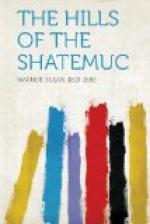“Ah, yes — you, — you may,” said the naturalist good-humouredly.
“When happiness can be found so near the surface,” said Rufus with a satiric glance at the cover of Elizabeth’s book, — “it would be folly to go further.”
“What do you live for, Mr. Herder?” said Elizabeth, giving Rufus’s words a cool go-by.
“I? — O I live to do my work,” said the naturalist.
“And what is that?”
“I live to find out the truth — to get at de truth. It is for that I spend my days and my nights. I have found out some — I will find out more.”
“And what is the purpose of finding out this truth, Mr. Herder?” said Rufus; — “what is that for? doesn’t that make you happy?”
“No,” said the naturalist with a serious air, — “it does not make me happy. I must find it out — since it is there — and I could not be happy if I did not find it; — but if dere was no truth to be found, I could make myself more happy in some ozer way.”
The fine corners of the young man’s mouth shewed that he thought Mr. Herder was a little confused in his philosophy.
“You think one ought to live to be happy, don’t you, Mr. Rufus?” said Miss Rose.
“No!” said Rufus, with a fire in his eye and lip, and making at the same time an energetic effort after a difficult branch of huckleberries, — “no! — not in the ordinary way!”
“In what way then?” said the young lady with her favourite pout.
“He has just shewed you, Miss Rose,” said Winthrop; — “in getting the highest huckleberry bush. It don’t make him happy — only he had rather have that than another.”
“Let us have your sense of the matter, then,” said his brother.
“But Mr. Herder,” said Elizabeth, “why do you want to find out truth? — what is it for?”
“For science — for knowledge; — that is what will do goot to the world and make ozer happy. It is not to live like a man to live for himself.”
“Then what should one live for,” said Elizabeth a little impatiently, — “if it isn’t to be happy?”
“I would rather not live at all,” said Rose, her pretty lips black with huckleberries, which indeed was the case with the whole party.
“You yourself, Mr. Herder, that is your happiness — to find out truth, as you say — to advance science and learning and do good to other people; you find your own pleasure in it.”
“Yes, Mr. Herder,” chimed in Rose, — “don’t you love flowers and stones and birds and fishes, and beetles, and animals — don’t you love them as much as we do dogs and horses? — don’t you love that little black monkey you shewed us the other day?”
“No, Miss Rose,” said the naturalist, — “no, I do not love them — I do not care for them; — I love what is back of those things; dat is what I want.”
“And that is your pleasure, Mr. Herder?”
“I do not know,” said the puzzled naturalist, — “maybe it is — if I could speak German, I would tell you; — Wint’rop, you do say nozing; and you are not eating huckleberries neizer; — what do you live for?”




